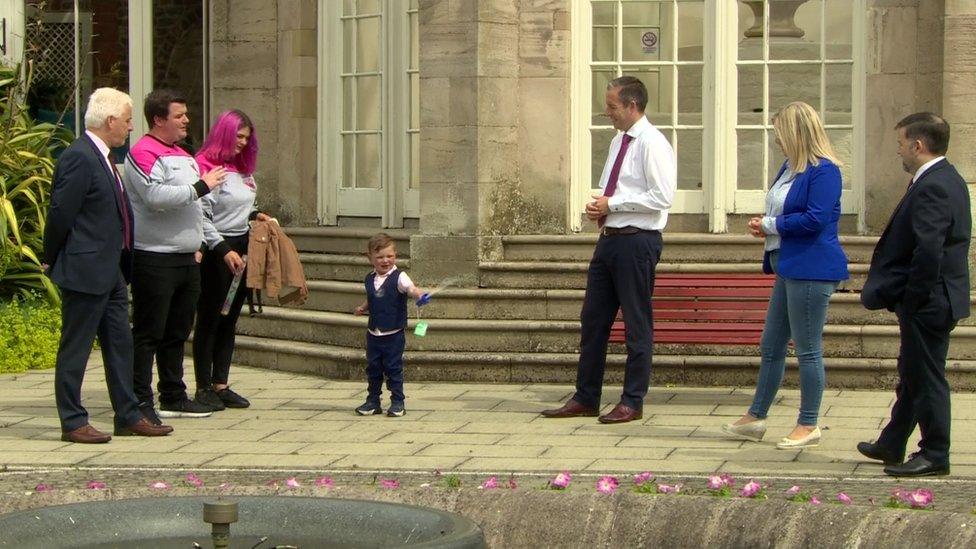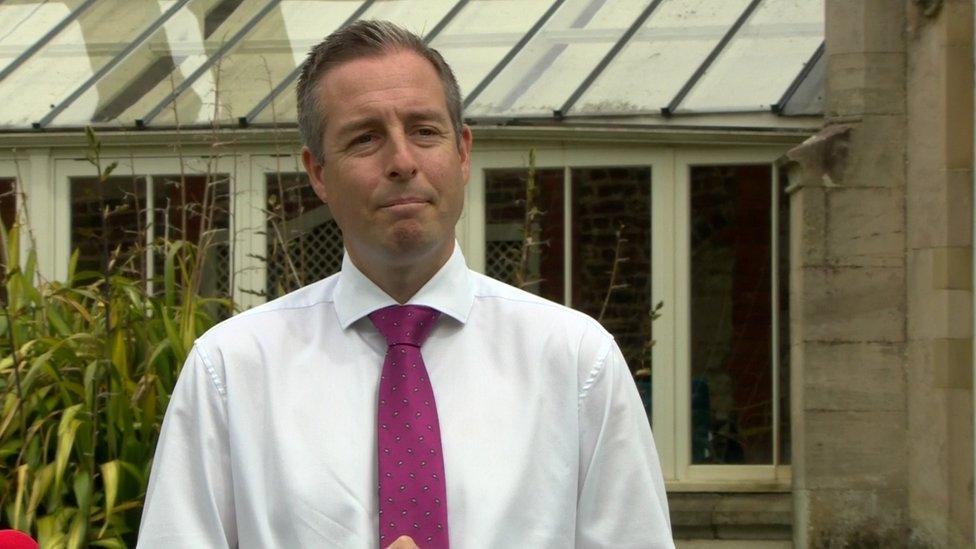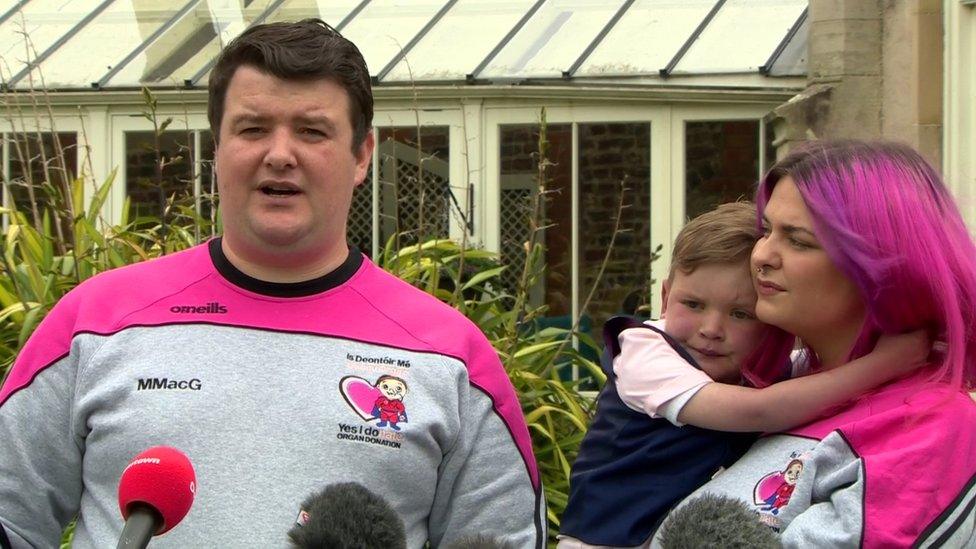Organ donation: NI law 'could change 180 lives a year'
- Published

Dáithí MacGabhann, who is waiting for a new heart, met NI's first and deputy first ministers and health minister
About 180 lives could be "changed" each year by a long-awaited law on opt-out organ donation in Northern Ireland, Health Minister Robin Swann has said.
First Minister Paul Givan announced the legislation had been given approval to proceed on Thursday.
It followed talks between Mr Givan, Mr Swann, who proposed the legislation, and organ donation campaigners.
The proposed bill would mean people automatically become donors unless they specifically say otherwise.
It needed approval from the Stormont executive before it could go to the assembly.
The first minister said the legislation could proceed by way of urgent procedure.
'Not a done deal'
Mr Swann said discussions on the law had been "going on for quite a while".
The Ulster Unionist MLA said Mr Givan's Democratic Unionist Party (DUP) had "concerns that we needed to address" and he believed that conversations with campaigners "convinced them that this bill was able to go to the next step".
It was "not a done deal", he added, "but we have got it on to the floor of the assembly".
Earlier, he had accused the DUP of blocking the bill on a "point of principle" and described the delay as very frustrating.
Mr Givan announced the movement on legislation in a social media post in which he thanked campaigners "for their efforts".
Allow X content?
This article contains content provided by X. We ask for your permission before anything is loaded, as they may be using cookies and other technologies. You may want to read X’s cookie policy, external and privacy policy, external before accepting. To view this content choose ‘accept and continue’.

It will be up to Speaker Alex Maskey to decide when the bill can be introduced in the assembly before the summer recess begins on 10 July.
Mr Maskey has a minimum of seven days to conduct legal scrutiny of any bill.
Mr Swann told BBC News NI's Good Morning Ulster programme: "We think it will see an additional 10 to 20 donors in Northern Ireland per year.
"That's the possibility of eight to nine organs per donor so that could have the impact of changing up to 180 lives in Northern Ireland per year.
"These are about live-saving operations and life-changing operations so that's the real step that we are going to see with this legislation when it does come in."
Northern Ireland is the only part of the UK without a soft opt-out system, after the law in England changed last year.

Paul Givan said his party supported the decision taken on Thursday evening
Currently donation will only proceed in Northern Ireland if a person has given their express consent, usually by signing on to the NHS Organ Donor Register or by speaking to their family.
In the absence of that, the family is asked to make a decision on behalf of the patient.
'A fighting chance'
Máirtín MacGabhann, whose four-year-old son Dáithí has been waiting for a new heart for three years, said he "was shaking" after he was personally told the news by Mr Givan ahead of the first minister's social media post on Thursday.

Máirtín MacGabhann said his son's smile had united politicians in supporting the legislation
"We are just so happy that it has got to this stage because what Robin Swann said there is time is still of the essence," he told Good Morning Ulster.
"It gives us a chance, it gives us a fighting chance."
Mr MacGabhann and his family met Stormont's first and deputy first ministers and health minister at Stormont Castle on Friday.
Speaking afterwards, he said he was "so delighted and so proud of our wee Dáithí".
"His wee smile has united all those on the hill," he continued.
First Minister Paul Givan, who said he signed up to the donor register "many years ago", explained he was "delighted" that the legislation would now go forward.
"It became very clear to me that we needed to get progress on this issue," he said.
"What this is about is people like Dáithí, people that are in need of that life-saving organ, and we need to encourage more people to do that."
Mr Givan said his party was in support of the decision taken on Thursday.
All of the executive parties apart from the DUP had expressed backing for the minister's bill.
Ahead of the announcement, it is understood some DUP ministers held concerns about the wording of the bill, while others in the party supported an opt-in system, rather than presumed consent for organ donation.
Some of Northern Ireland's most senior clinicians had warned that Northern Ireland was not ready for such a system and described that bill as unhelpful.
Deputy First Minister Michelle O'Neill said the legislation was "powerful" and Dáithí was "the face" of the campaign.
"It is very much a positive day," she said.
"This is, for me, a demonstration of good politics and politics in action and actually politics making a difference in people's lives."
Dr Tom Black, chair of the British Medical Association Council in Northern Ireland, welcomed the legislation move "after years of delay".
He said: "Up to 115 people in Northern Ireland are on the transplant waiting list and last year 11 people died waiting for an organ, so ensuring this legislation is progressed as quickly as possible is vital to saving lives.
"We hope our elected representatives continue to work towards introducing a soft opt-out system and we look forward to continuing to engage with them on this important issue."
'Reckless disregard'
Mr Swann's bill is not the only piece of legislation that has faced delay due to disagreement within the executive.
This week, Justice Minister Naomi Long said her proposals to strengthen protections for victims of sexual abuse were being blocked.
The DUP had opposed her Justice Bill as it was too wide-ranging, she said, but on Thursday ministers supported an amended version.
"It is a very good day for people who have been victims and are victims of sexual abuse or human trafficking because this is the green light for us to be able to take forward some really key provisions from Sir John Gillen's review of serious sexual offences procedures," Mrs Long told Good Morning Ulster.
Sir John Gillen reviewed Northern Ireland's sex crime procedures after a high-profile rape trial in 2018 and he made more than 250 recommendations, many of which were aimed at making the system less traumatic for abuse victims.
Mrs Long explained that the new legislation agreed by Stormont minsters includes:
powers to exclude members of the public from attending serious sexual offence court cases
the extension of anonymity provisions in sexual offence cases
a new offence which outlaws adults from masquerading as children in online communications
new offences which outlaw "upskirting" and downblousing" photography or filming
Mrs Long, the Alliance Party leader, said she believed it was "public pressure of public campaigning" which made ministers agree the legislation before the impending deadline of this assembly term.
She said: "I mean, can you imagine the public anger if these serious sexual offence cases had not been able to be dealt with?"
- Published11 December 2020

- Published22 July 2020
